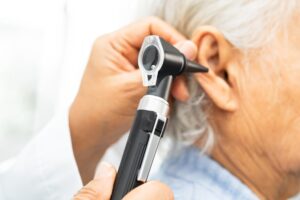For many adults, getting older means having to adjust to many age-related issues. For some this can be the manifestation of new aches and pains, but for others, getting older is accompanied with trouble hearing. It can start almost imperceptibly at first, until one day they aren’t able to hear high pitched noises or the volume at which they listen to movies or television becomes unbearable for those around them. The truth is, many people experience progressive hearing changes, even with hearing aids or previous treatments. Let’s explore why hearing loss progresses and what you can do to lessen its impact on your life.
Understanding Progressive Hearing Loss
Think of your hearing like a well-worn path in a forest. As time progresses and without proper care or maintenance, this path can become increasingly difficult to traverse. Hearing loss can follow a similar pattern, where gradual changes might go unnoticed until they begin to impact day to day activities.
Common Risk Factors That Accelerate Hearing Loss
One of the most impactful factors affecting hearing loss is related to your environment. For example, a construction worker exposed to daily noise levels above 85 decibels (about as loud as heavy city traffic) faces different risks than would someone who works in an office environment.
Here are some key factors that can influence a person’s hearing decline:
- Age-related changes within the inner ear, delicate hair cells may decline in their effectiveness over time. Typically starting around age 45, this process, called presbycusis, often affects high-frequency sounds first–like birds chirping or the voice of children.
- Noise exposure impact from repeated exposure to loud sounds can accelerate hearing loss. For reference:
- Concerts: 110 dB (safe for about 2 minutes)
- Lawn mower: 90 dB (safe for about 2 hours)
- Normal conversation: 60 dB (safe for an unlimited time)
- Medical conditions and certain treatments can dramatically impact a person’s hearing health:
- Diabetes can damage blood vessels in the inner ear
- High blood pressure may reduce blood flow to the auditory systems
- Some types of chemotherapy medications can affect hearing sensitivity
Warning Signs Your Hearing Loss May Be Progressing
The progression of a person’s hearing loss often reveals itself in everyday situations. Recognizing these signs early can make a significant difference in managing a person’s hearing health:
- Social Situations
- Finding yourself saying “What?” more frequently when in group settings
- Struggling to follow conversations in loud environments and restaurants
- Missing alerts or notifications like for the doorbell or phone
- Entertainment Changes
- Regularly increasing TV or music volume
- Having trouble understanding movie or TV dialogue
- Missing song lyrics you once knew by heart
Taking Action: Protection and Prevention
Prevention becomes crucial once you begin to notice the symptoms of hearing loss. Modern research shows that proactive protection can significantly slow progression. Consider these scientifically-backed strategies:
Immediate Protection Steps
- Invest in professional hearing protection rated for your specific needs
- Take regular listening breaks during noisy activities
- Position yourself strategically in social situations so that you’re away from speakers or loud noise sources
Long-Term Health Strategies
Regular exercise improves blood flow to your ears, which can potentially slow age-related decline. A heart-healthy diet rich in omega-3 fatty acids, found in fish like salmon, may help protect against further hearing loss.
Professional Intervention and Modern Solutions
Today’s hearing solutions go far beyond traditional hearing aids. Advanced digital technology can now:
- Automatically adjust to different environments
- Connect directly to smartphones and TVs
- Filter out background noise while enhancing speech
When to Seek Professional Help
Don’t wait until hearing loss significantly impacts your daily life. Contact us to schedule a comprehensive hearing exam if you:
- Notice any sudden changes in hearing ability
- Experience ringing or buzzing in your ears
- Find yourself feeling isolated in social situations
Common Concerns About Hearing Loss
One of the most pressing concerns that patients bring to audiologists involves whether hearing damage can be undone. Medical research indicates permanent hearing damage generally remains, as the name implies, irreversible. However, swift action when noticing changes often prevents the condition from worsening. That’s why our specialists typically recommend yearly check-ups once you turn 50, similar to scheduling annual vision tests.
Some patients express worry that hearing devices could harm their hearing further. Recent research seems to indicate the opposite effect — quality hearing aids keep the auditory system sharp. When fitted correctly by a professional, these devices stimulate nerve pathways and maintain the brain’s sound processing abilities.
Moving Forward with Better Hearing
Knowledge truly does matter when managing progressive hearing loss. By understanding the underlying causes, you gain power over your hearing journey. Current technological breakthroughs and scientifically proven protection methods offer real possibilities for maintaining connections with the world of sound.
Time matters when protecting your hearing.
Don’t wait — reach out to one of our qualified hearing professionals to schedule your test today. Your hearing health deserves attention now and taking this important step today helps safeguard your ability to engage fully in the world around you. Book an evaluation with one of our expert audiologists who specialize in comprehensive testing.




